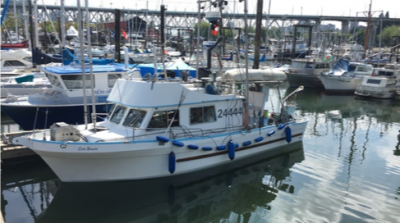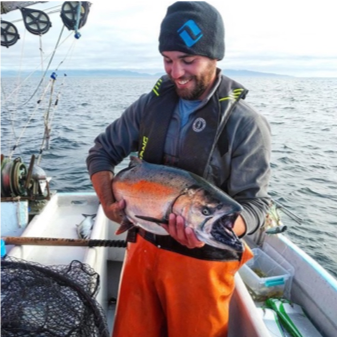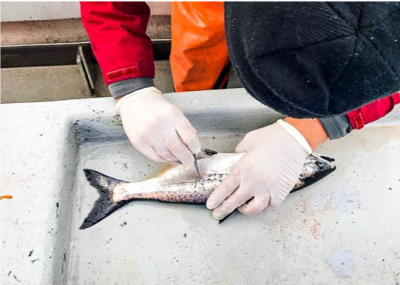
The Carte Blanche, commercial salmon troller and temporary salmon research vessel. Photo: Mei Sato
The hydraulics whirled, the fishing line tightened, and out of the water splashed a wild salmon, nearly a meter long. Once the fish was brought aboard the commercial salmon troller Carte Blanche, it was quickly identified as a Chinook salmon. However, this fish wasn’t processed for sale, but instead the salmon was measured for size, fat content, and a scale was taken for stock identification.
This was part of work studying Chinook salmon undertaken by a team of researchers from UBC along the BC coastline earlier this summer.
Aboard the Carte Blanche was Jacob Lerner, a UBC PhD student and part of the Pelagic Ecosystems Lab, whose research focuses on the relationship between the salmon and the marine ecosystem. He is investigating how fat content changes between stocks of Chinook and across regions of the coast. For three weeks, he measured the fat content of Chinook caught in Juan de Fuca and Johnstone Strait, two regions frequented by both Northern and Southern resident killer whales, laying the groundwork for research into Chinook salmon trophic ecology and their value as prey.

Jacob Lerner handles a large Chinook salmon, that will be released after measurements are taken. Photo: Mei Sato
Despite their importance, many Chinook stocks in BC have been in decline. Both Northern and Southern resident orcas feed on Chinook, yet Northern populations have been growing while Southern populations have been stagnating. In light of the decline of Southern residents, questions about Chinook prey availability and the nutritional value of the accessible Chinook have been raised alongside previous concerns about contaminants and boat traffic.
Working with the federal department Fisheries, Oceans and the Canadian Coast Guard, along with sports fishing lodges and research labs throughout BC, the Pelagic Ecosystems Lab team is in the process of reconstructing the life history of individual Chinook stocks. Their research investigates how distribution, regional food-webs, and trophic ecology can impact the quality of the Chinook as prey and the condition of at-risk populations. The implications of this work are far reaching; ranging from the health of resident orca populations to the sustainability of the BC sports and commercial fishing communities.

Taking scales from a small Chinook for genetic stock identification. Photo: Mei Sato
After disembarking the Carte Blanche, Lerner hopped aboard the SeaCrest, a commercial trawler, for a research trip looking at the coastal food-webs around Vancouver Island. Once he returns to UBC, he will be joined by other researchers as they continue to study regional food-webs in their entirety. In this way, scientists can position Chinook in their ecosystems and begin to assess the impacts these systems may have on Chinook trophic ecology and quality as prey.
Tags: British Columbia, fieldwork, food webs, IOF students, killer whales, Pelagic Ecosystems Lab, Research, salmon, whales